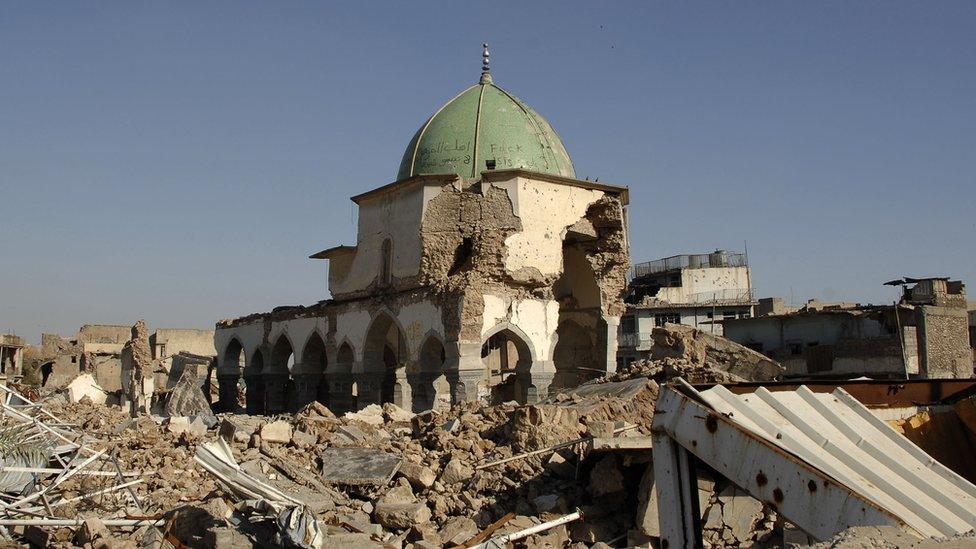Vienna shooting: Austria hunts suspects after 'Islamist terror' attack
- Published
Eyewitness Rabbi Schlomo Hofmeister talks about the 2 November Vienna attack
Austrian police have urged people to stay indoors as they hunt for suspects after a multiple gun attack in the capital Vienna that killed four people.
A gunman shot dead by police has been identified as a 20-year-old "Islamist terrorist" who was released early from jail in December.
Two men and two women died of their wounds after gunmen opened fire at six locations in the city centre on Monday evening.
Twenty-two people were wounded.
Austrian Chancellor Sebastian Kurz said the four who died were an elderly woman, an elderly man, a young male passer-by and a waitress. Witnesses described how the gunmen had opened fire on people outside bars and chased them as they fled inside.
It was clearly an attack driven by "hatred of our way of life, our democracy", the chancellor said. He earlier spoke of a "repulsive terror attack".
The nation was engaged not in a battle between Christians and Muslims, he stressed, but "between civilisation and barbarism".
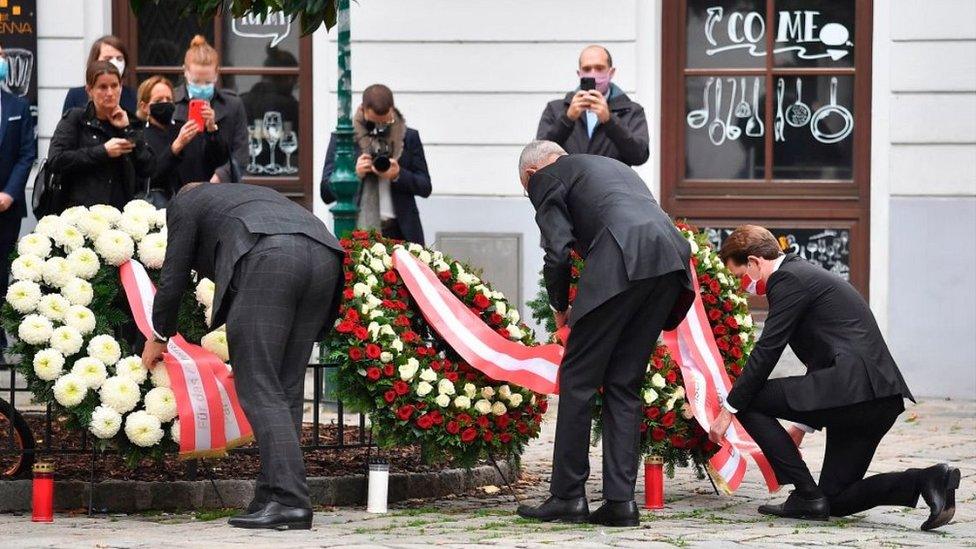
Austria's political leaders honoured the victims in Vienna as the nation mourned
Islamic State connection
Interior Minister Karl Nehammer described the dead gunman as an "Islamist terrorist", jailed for 22 months in April 2019 after trying to get to war-torn Syria to join Islamic State (IS) jihadists. The 20-year-old had been released early last December under more lenient terms for young adults.
Mr Nehammer urged Austrians to "please stay at home if possible" during the police operation and "avoid the inner city". Children should stay at home, not go to school on Tuesday, he said.
Austrian daily Der Standard reports that 90% of shops in the city centre are now shut.
The victims were in a city centre area busy with people in bars and restaurants, near Vienna's central synagogue.
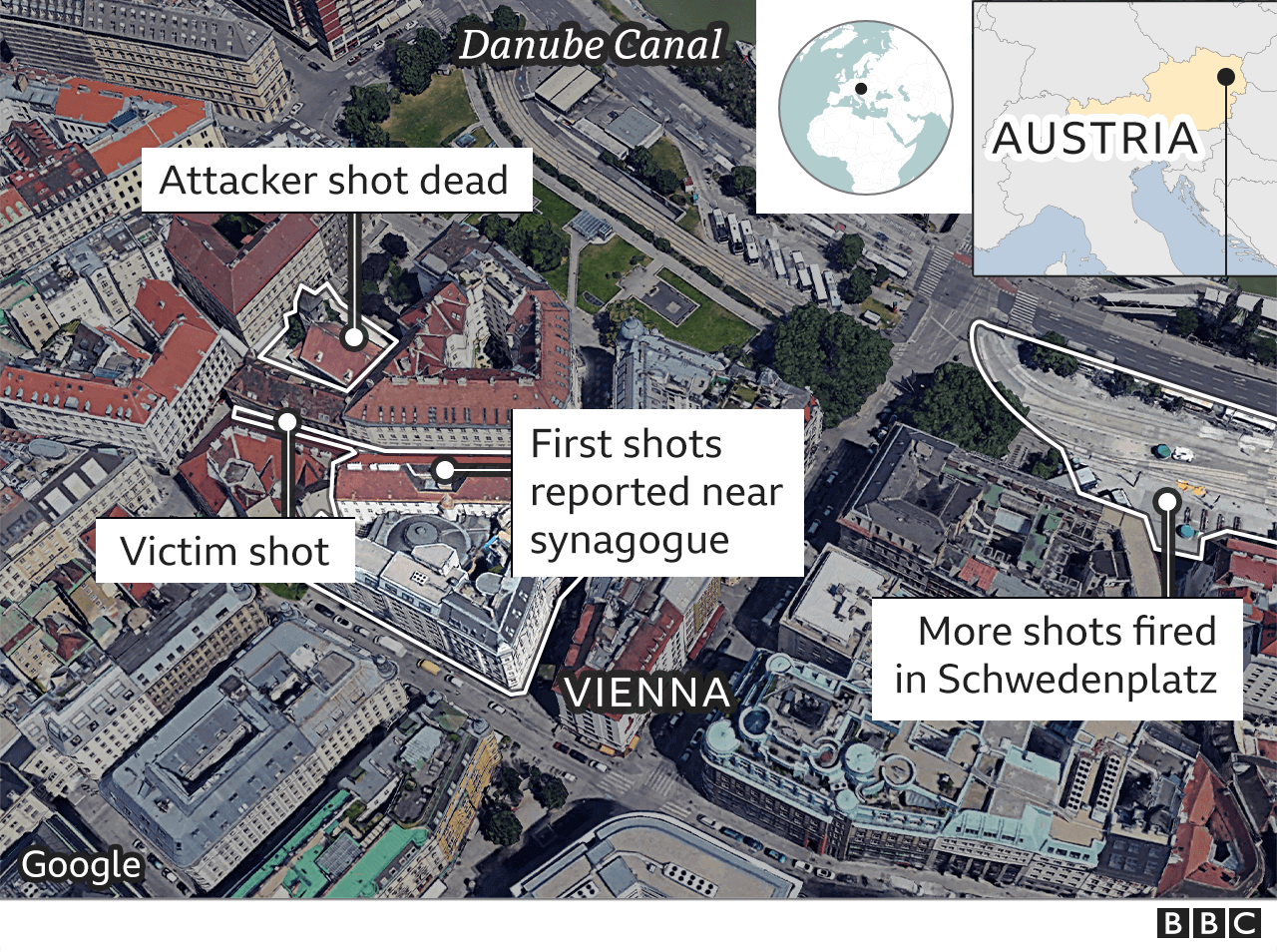

Police cordoned off some streets and brought in reinforcements. They are also being helped by the Austrian army.
Addressing a news conference, Mr Nehammer said police had searched the home of the dead gunman and seized video material. He had been wearing a fake explosive belt, police said.
The man was originally from North Macedonia and had a previous conviction for terrorist association, Mr Nehammer said. He had both Austrian and Macedonian citizenship.
Several arrests were made during searches of 15 nearby homes. Two suspects were also arrested in St Pölten, a town to the west of Vienna.
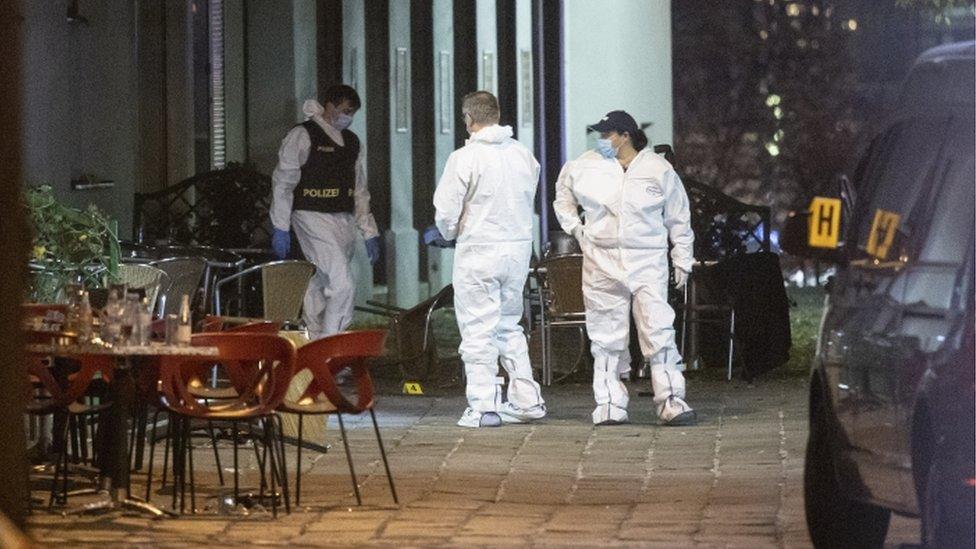
Bars were targeted in a popular area of Vienna known as the "Bermuda Triangle"
The Vienna shooting comes after a spate of Islamist militant attacks in France.
Last month French history teacher Samuel Paty was beheaded outside a school in a suburb of Paris. Then, as the government launched new measures to tackle militant Islam, a Tunisian man fatally stabbed three people in a cathedral in Nice.
The worst IS attack in Europe in recent years was in November 2015, when gunmen killed 130 people in Paris.
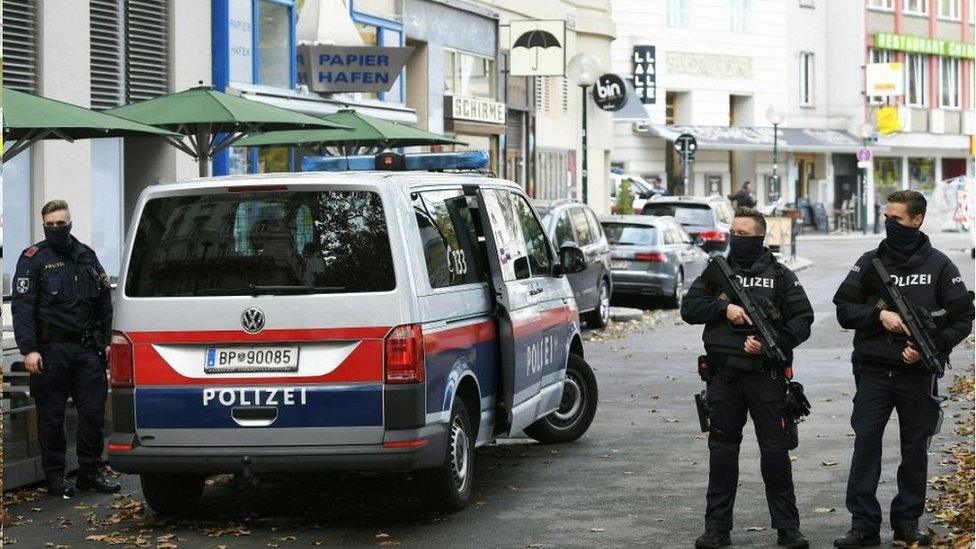
Police flooded into several central streets where shooting took place
Mr Nehammer said at least one "heavily armed and dangerous" attacker was believed to be still at large. Officials were quoted as saying there could have been as many as four attackers.
The attack came hours before Austria imposed new national restrictions to try to stem rising cases of coronavirus. Many people were enjoying drinks and eating out before a midnight curfew.
Police named six crime scenes in central Vienna: Seitenstettengasse and nearby Morzinplatz, Salzgries, Fleischmarkt, Bauernmarkt and Graben. The suspect was shot dead near St Rupert's Church.
Austria's government announced three days of national mourning, starting immediately. Flags flew at half-mast and a minute's silence was held at midday. Schools are to hold a minute's silence for the victims on Wednesday morning.
How did the attack unfold?
Police say the incident began at about 20:00 (19:00 GMT), near the Seitenstettengasse synagogue, when a heavily armed man opened fire on people outside cafes and restaurants.
Vienna Community Rabbi Schlomo Hofmeister said he saw at least two gunmen shoot at least 100 rounds in front of the synagogue compound. "They were attacking the guests of bars and pubs. People were jumping and running, falling over the tables, running inside the bars followed by the gunmen also running inside the bars," he told London radio station LBC.
Members of the special forces quickly arrived at the scene. One policeman was shot and critically wounded before the perpetrator, armed with an automatic rifle, a pistol and a machete, was, in the police chief's words, "neutralised" at 20:09.
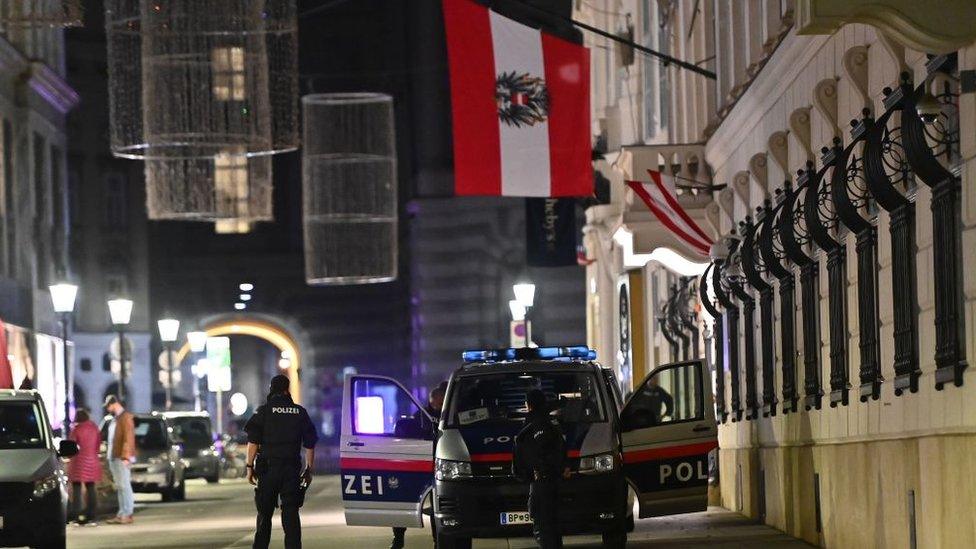
Police increased security outside the interior ministry after the shooting
Jewish community leader Oskar Deutsch said the synagogue was closed at the time.
Footage posted on social media showed scenes of chaos as people ran through the streets with gunshots ringing out in the background.
Witness Chris Zhao, who was in a nearby restaurant, told the BBC: "We heard noises that sounded like firecrackers. We heard about 20 to 30 and we thought that to be actually gunfire. Sadly, we also saw a body lying down the street next to us."
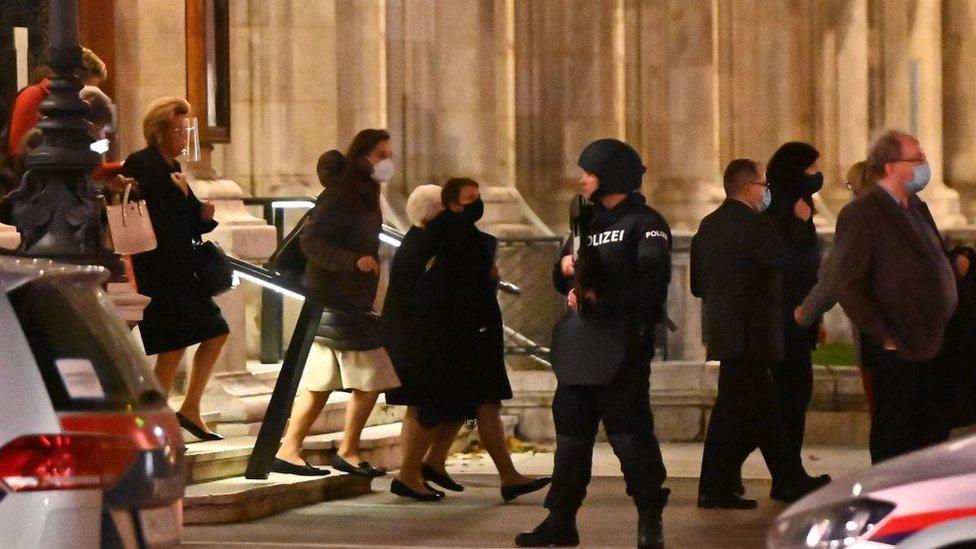
Guests left the Vienna State Opera under the watch of armed police
A major anti-terrorist operation swung into action and police set up roadblocks around the city centre.
Barbara Lovett, who was in the Vienna State Opera at the time, said that when the evening performance ended the manager had told the audience of the attack and that they could not leave.
"The players came back out from the dressing rooms, in their normal clothes, sat down in the orchestra pit and played for another 20 minutes," she told the BBC. "They played the German national anthem, which used to be the Austrian anthem - the Emperor Quartet by Haydn."
Allow X content?
This article contains content provided by X. We ask for your permission before anything is loaded, as they may be using cookies and other technologies. You may want to read X’s cookie policy, external and privacy policy, external before accepting. To view this content choose ‘accept and continue’.

Police in the neighbouring Czech Republic said they were carrying out random checks on the border with Austria in case the attackers fled in that direction.
What reaction has there been?
European leaders strongly condemned the shooting. British Prime Minister Boris Johnson said he was "deeply shocked by the terrible attacks" while Germany's Angela Merkel said "the fight against Islamist terrorism is our common struggle".
Austria had until now been spared the sort of attacks that have hit other European countries.
French President Emmanuel Macron said Europe must not "give up" in the face of attacks. Last week he described the murder of three people in Nice as an "Islamist terrorist attack".
Home Secretary Priti Patel said the UK would "stand ready to support in any way we can".
US President Donald Trump - on the campaign trail ahead of Tuesday's election - described it as "yet another vile act of terrorism in Europe".
His Democratic challenger Joe Biden condemned the "horrific terrorist attack", adding: "We must all stand united against hate and violence."

Islamist terror attacks in Europe
Nov 2020: Two men and two women killed by gunmen in busy streets in central Vienna - police shoot and kill one attacker, previously jailed
Oct 2020: Three people fatally stabbed in cathedral in Nice, France - Tunisian assailant shot and wounded by police
Oct 2020: French teacher Samuel Paty beheaded by a Chechen teenager outside a school in a Paris suburb
Oct 2019: Radicalised police computer operator Mickaël Harpon is shot dead after stabbing to death three officers and a civilian worker at Paris police HQ
Mar 2019: Four people killed and two seriously wounded by gunman on a tram in the Dutch city of Utrecht
Aug 2017: A van attack is launched on pedestrians in Barcelona, and another attack in the Catalan coastal town of Cambrils. Sixteen people killed, more than 130 injured
May 2017: A bombing at a pop concert in Manchester, England, kills 22. Weeks later, eight people are killed and dozens injured in a van and knife attack in central London
Jul 2016: A gunman drives a large lorry into a crowd celebrating Bastille Day in Nice, killing 86 people - attack claimed by IS.


Do you have any information you can share? If it is safe to do so, please get in touch by emailing haveyoursay@bbc.co.uk, external.
Please include a contact number if you are willing to speak to a BBC journalist. You can also get in touch in the following ways:
WhatsApp: +44 7756 165803
Tweet: @BBC_HaveYourSay, external
Please read our terms & conditions and privacy policy
If you are reading this page and can't see the form you will need to visit the mobile version of the BBC website to submit your question or comment or you can email us at HaveYourSay@bbc.co.uk, external. Please include your name, age and location with any submission.
- Published3 November 2020
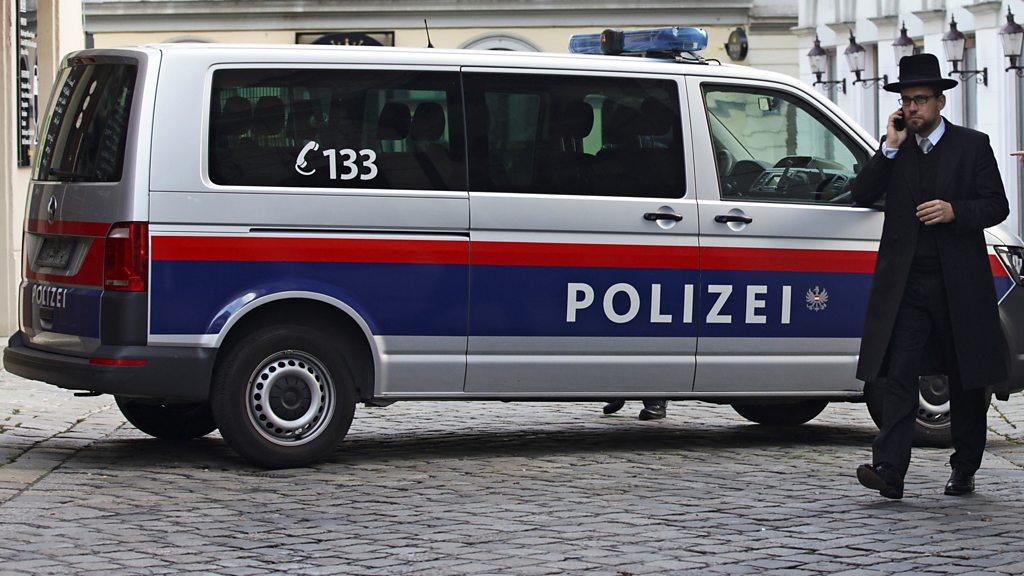
- Published23 March 2019
